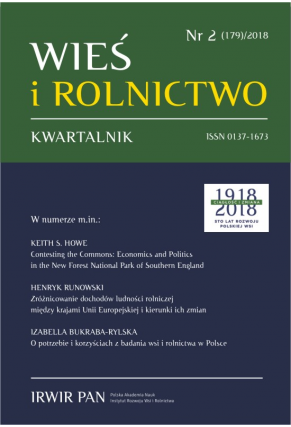Food Security and Environmental Impact of Agriculture in the European Transition Economies
DOI:
https://doi.org/10.53098/wir.2018.2.179/07Keywords:
European transition economies, food security, sustainable development of agriculture, CAPAbstract
This paper deals with the problem of relations between agriculture and environment, considered in the context of political changes that took place in Central and Eastern Europe. Against the background of general considerations on the significance of natural and anthropogenic factors (including mainly politics), the research refers to the European post-communist countries, some of which joined the EU, and some being still outside the group. Research results were compared with the corresponding values for EU-15 Member States and the average values for the World. The analysis covered the period between 1993–2013, i.e. the years of the undisturbed existence of the countries concerned. Using the original methodology, we identified changes in the productivity of agriculture (understood as the amount of agricultural energy produced per 1 ha) and agriculture’s impact on the environment, estimated as the amount of greenhouse gas emissions. Results of the analysis proved that demographic and natural factors had an essential impact on the intensity of agricultural production and the scale of greenhouse gas emissions. The possibility to achieve food security depended on the technologies used, and indirectly on the level of the country’s economic development. Attention was paid to a different approach to the development of agriculture in the transition countries which are EU Member States and those which are not. With regard to the environmental sustainability, the greatest progress has been made by the transition countries which did not join the EU. Within this context, we considered some non-political factors shaping the relationship between agriculture and environment.References
Czyżewski A., Czyżewski B. (2016). Research challenges for agricultural economics in the new paradigm. W: B. Czyżewski (red.). Political Rents of European Farms in Sustainable Development Paradigm: International, National and Regional Perspective (s. 18–27). Warszawa: Wydawnictwo Naukowe PWN.
Dzun W., Tereszczuk M. (2009). Rolnictwo Rosji, Ukrainy i Białorusi w procesie transformacji w latach 1990–2007. Warszawa: Instytut Ekonomiki Rolnictwa i Gospodarki Żywnościowej – PIB.
Halamska M. (1998). Dekolektywizacja rolnictwa w Europie Środkowo-Wschodniej i jej konsekwencje. Warszawa: Instytut Rozwoju Wsi i Rolnictwa PAN.
Jankowska A. (2016). Typologia rolnictwa krajów kandydujących do Unii Europejskiej ze względu na wybrane cechy sektora rolnego. Zeszyty Naukowe Szkoły Głównej Gospodarstwa Wiejskiego w Warszawie. Problemy Rolnictwa Światowego, 16 (2), 145–153. DOI: https://doi.org/10.22630/PRS.2016.16.2.36
Majerova V., Sálus J., Stieva T., Valcheva E. (2016). Economic and social preconditions of development in the Czech rural areas: Acceleration of global influence and local changes. W: A. Kowalski, M. Wigier, B. Wieliczko (red.). Ekonomia versus środowisko – konkurencyjność czy komplementarność (s. 87–100). Warszawa: Instytut Ekonomiki Rolnictwa i Gospodarki Żywnościowej – PIB.
Poczta W., Baer-Nawrocka A. (2016). The sustainability of agriculture in the European Union against a global backdrop. W: B. Czyżewski (red.). Political Rents of European Farms in Sustainable Development Paradigm: International, National and Regional Perspective (s. 60–68). Warszawa: Wydawnictwo Naukowe PWN.
Poczta W., Sadowski A., Średzińska J. (2008). Rola gospodarstw wielkotowarowych w rolnictwie Unii Europejskiej. Roczniki Nauk Rolniczych. Seria G – Ekonomika Rolnictwa, 95 (1), 42–56.
Rowiński J. (2011). Wsparcie rolnictwa w wybranych krajach. Warszawa: Instytut Ekonomiki Rolnictwa i Gospodarki Żywnościowej – PIB.
Sadowski A. (2009). Gospodarstwa rolne w koncepcji polityki zrównoważonego rozwoju obszarów wiejskich. Journal of Agribussines and Rural Development, 2 (12), 167–173.
Sadowski A. (2012). Zrównoważony rozwój gospodarstw rolnych z uwzględnieniem wpływu Wspólnej Polityki Rolnej Unii Europejskiej. Poznań: Uniwersytet Przyrodniczy w Poznaniu.
Sadowski A. (2017). Wyżywieniowe i środowiskowe funkcje światowego rolnictwa: Analiza ostatniego półwiecza. Poznań: Uniwersytet Przyrodniczy w Poznaniu.
Sadowski A., Czubak W. (2012). Zakres i instrumenty polityki rolnej stosowane w różnych systemach społeczno-ekonomicznych w Polsce. W: W. Czubak, E. Kiryluk-Dryjska,
W. Poczta, A. Sadowski (red.). Wspólna Polityka Rolna a rozwój rolnictwa w Polsce (s. 41–54). Poznań: Uniwersytet Przyrodniczy w Poznaniu.
Sadowski A., Czubak W. (2013). The priorities of rural development in the EU countries in years 2007–2013. Agricultural Economics, 59 (2), 58–73. DOI: https://doi.org/10.17221/102/2012-AGRICECON
Sadowski A., Poczta W., Beba P., Szuba-Barańska E. (2016). Zróżnicowanie produktywności modeli gospodarstw rolnych w UE. Wieś i Rolnictwo, 1 (170), 127–138. DOI: https://doi.org/10.53098/wir012016/07
Sadowski A., Poczta W., Szuba-Barańska E., Beba P. (2015). Modele gospodarstw rolnych w państwach Unii Europejskiej. Wieś i Rolnictwo, 3 (168), 43–62.
Szpak J. (2007). Historia gospodarcza powszechna. Warszawa: Polskie Wydawnictwo Ekonomiczne.
Tudor M. (2016). Resilience of Romanian agriculture: An overview. W: A. Kowalski, M. Wigier, B. Wieliczko (red.). Ekonomia versus środowisko – konkurencyjność czy komplementarność (s. 150–159). Warszawa: Instytut Ekonomiki Rolnictwa i Gospodarki Żywnościowej – PIB.
Downloads
Article file downloads
Pages
How to Cite
Issue
Section
License
Copyright (c) 2018 Village and Agriculture

This work is licensed under a Creative Commons Attribution 4.0 International License.






